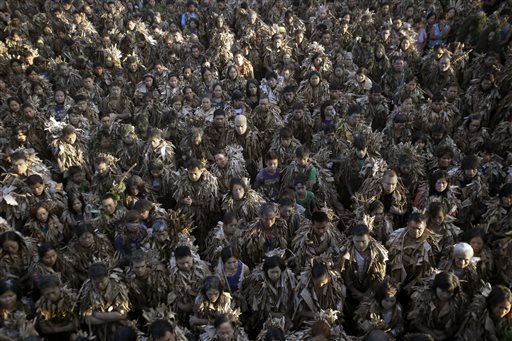
Residents clad in mud and dried Banana leaves attend a mass to celebrate the Feast Day of St. John the Baptist in the village of Bibiclat, Aliaga township, Nueva Ecija province in northern Philippines,Wednesday, June 24, 2015. AP
BIBICLAT, Philippines—At dawn every June 24th, people from Bibiclat village in the northern Philippines’ Nueva Ecija province pay homage to their patron saint, John the Baptist, by gathering in silence in a swampy field to cover themselves in mud, donning mud-drenched capes made of dried banana leaves.
The village’s “Taong Putik,” or “mud people” festival, dates back to the Japanese occupation of the Philippines in the 1940s, according to the village chief, Norberto Eugenio.
Japanese troops in Bibiclat during World War II gathered many of the male villagers in a church courtyard for execution. The women and children prayed to Saint John the Baptist to spare them, and suddenly there was a downpour, causing the soldiers and their captives to scatter, Eugenio said.
The villagers were so happy that they rolled in the mud, he said, and they have carried on that tradition ever since.
During the festival, men, women and children — some covered with capes from head to foot, eyes peering from a cake of mud on their faces — collect candles from bystanders along the village’s main street on their way to St. John the Baptist’s Church. They light the candles and make wishes, expecting them to be fulfilled because of their efforts.
The former parish priest of the village, William Villviza, said the mud also “reminds one of the lowness of one’s being” and enables one to be “close to the earth.”
Residents clad in mud and dried Banana leaves attend a mass to celebrate the Feast Day of St. John the Baptist in the village of Bibiclat. AP
A muddied girl, donning a cape made of dried banana leaves, collects candles before attending a mass to celebrate the Feast Day of St. John the Baptist in the village of Bibiclat. AP
Residents, with their faces covered with mud and donning mostly dried Banana leaves, collect candles prior to attending a mass to celebrate the Feast Day of St. John the Baptist in the village of Bibiclat. AP